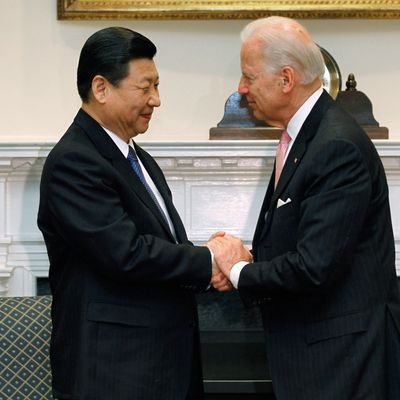
With the American Rescue plan headed to Joe Biden’s desk, the second item on the president’s agenda is starting to come into view: A bipartisan bill to increase U.S. economic competitiveness vis-à-vis China.
The Biden administration had initially intended to follow up a COVID relief plan with an infrastructure “recovery” package, the first aimed at alleviating acute deprivation caused by the COVID crisis, the second at laying the foundations for prolonged, equitable, ecofriendly growth in the pandemic’s aftermath. But the latter proposal has taken longer to develop than anticipated, with the White House repeatedly pushing back the projected date of its unveiling. Meanwhile, a distinct but related package of industrial policies — this one focused less on curbing climate emissions than on averting Chinese economic supremacy — has gained momentum.
In recent years, as the Chinese state accelerated its efforts to move up the value chain of international trade — which is to say, to compete more through the quality of its high-tech exports and less through the hyper-exploitability of its unskilled labor force — some congressional Republicans began putting great-power competition above free-market fundamentalism. And the COVID pandemic reinforced this softening of GOP orthodoxy by exposing America’s reliance on foreign supply chains for critical medical equipment. Indiana senator Todd Young has been an especially enthusiastic Republican advocate for industrial policy. Last year, he joined Chuck Schumer in co-sponsoring a bill that would invest $10 billion in regional tech hubs and expand the National Science Foundation into a National Science and Technology Foundation, empowering this new entity to distribute $100 billion to an array of university research programs and manufacturing sites. Republican lawmakers have co-sponsored several other bipartisan bills aimed at reducing American reliance on Chinese rare materials and telecommunications firms.
Now the Washington Post reports that Schumer intends to roll a bunch of these bipartisan, China-related economic measures into a single package and make it his caucus’s next legislative priority:
Schumer said Democrats’ legislative package on China would aim to include measures to shore up U.S. supply chains, expand American production of semiconductors, create 5G networks nationwide and pour billions into investments into U.S. manufacturing companies and hubs, among other proposals.
“In addition to addressing the climate crisis, racial and economic inequities and immigration, passing legislation to enable the United States to out-compete China and create American jobs if a crucial part of Democrats’ efforts to Build Back Better,” Schumer said in a statement.
The political logic behind this move seems clear: With the American Rescue Plan, Democrats prioritized substance over bipartisanship, passing a markedly progressive $1.9 trillion bill on a party-line vote. This contravened the preferences of many moderate Democrats, including the (all-powerful) West Virginia senator Joe Manchin. At the same time, many of the GOP’s 2024 presidential hopefuls have signaled their intention to center their campaigns on hard-line anti-China stances. Thus, by making a bipartisan “China” package their next agenda item, Democrats can get their congressional moderates — and sitting president — the bipartisan bonafides they desire while preempting a potential line of attack from the 2024 GOP nominee. Alternatively, if Senate Republicans suddenly cease supporting industrial policies that they co-sponsored just last year, then Democratic leaders should have an easier time convincing Manchin that they simply don’t have any reasonable Republicans to compromise with and must therefore weaken the filibuster. Which is to say: From a political perspective, the China bill could put the GOP in the lose-lose position of either enhancing Biden’s popularity by handing him a bipartisan victory or increasing the odds of filibuster abolition by exposing the party’s intransigence.
This said, the gambit isn’t devoid of political risks. In recent interviews, Manchin has expressed enthusiasm for infrastructure spending — but also concerns about the deficit. To the extent that moderate Democrats’ appetite for both tax hikes and deficit financing is finite, it’s possible that putting a China-centric industrial policy before a climate-centric one will constrain the White House’s ambitions on the greatest policy challenge facing humanity. Separately, founding bipartisan comity on hostility toward a foreign power could fuel the ongoing resurgence in anti-Asian xenophobia within the United States.






























